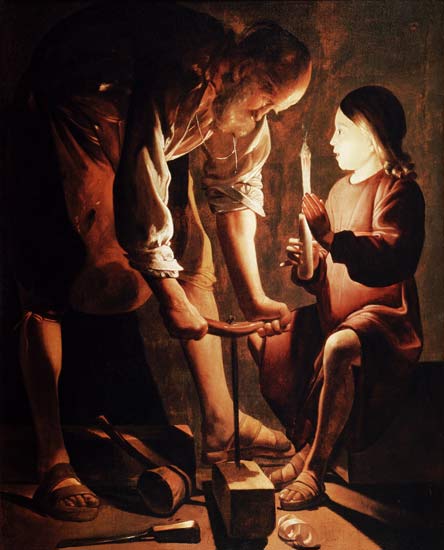 On this Christmas Eve, I just wanted to share these thoughts, from a sermon by Saint Augustine found in the Office of Readings for today's Divine Office. It concerns the taking on of human flesh by Jesus, the Second Person of the Most Holy Trinity---which, of course is the REAL point of this whole Christmas thing anyway.
On this Christmas Eve, I just wanted to share these thoughts, from a sermon by Saint Augustine found in the Office of Readings for today's Divine Office. It concerns the taking on of human flesh by Jesus, the Second Person of the Most Holy Trinity---which, of course is the REAL point of this whole Christmas thing anyway.Truth has arisen from the earth and justice has looked down from heaven
Awake, mankind! For your sake God has become man. Awake, you who sleep, rise up from the dead, and Christ will enlighten you. I tell you again: for your sake, God became man.
You would have suffered eternal death, had he not been born in time. Never would you have been freed from sinful flesh, had he not taken on himself the likeness of sinful flesh. You would have suffered everlasting unhappiness, had it not been for this mercy. You would never have returned to life, had he not shared your death. You would have been lost if he had not hastened ‘to your aid. You would have perished, had he not come.
Let us then joyfully celebrate the coming of our salvation and redemption. Let us celebrate the festive day on which he who is the great and eternal day came from the great and endless day of eternity into our own short day of time.
He has become our justice, our sanctification, our redemption, so that, as it is written: Let him who glories glory in the Lord.
Truth, then, has arisen from the earth: Christ who said, I am the Truth, was born of the Virgin. And justice looked down from heaven: because believing in this new-born child, man is justified not by himself but by God.
Truth has arisen from the earth: because the Word was made flesh. And justice looked down from heaven: because every good gift and every perfect gift is from above.
Truth has arisen from the earth: flesh from Mary. And justice looked down from heaven: for man can receive nothing unless it has been given him from heaven.
Justified by faith, let us be at peace with God: for justice and peace have embraced one another. Through our Lord Jesus Christ: for Truth has arisen from the earth. Through whom we have access to that grace in which we stand, and our boast is in our hope of God’s glory. He does not say: “of our glory,” but of God’s glory: for justice has not come out of us but has looked down from heaven. Therefore he who glories, let him glory, not in himself, but in the Lord.
For this reason, when our Lord was born of the Virgin, the message of the angelic voices was: Glory to God in the highest, and peace to men of good will.
For how could there be peace on earth unless Truth has arisen from the earth, that is, unless Christ were born of our flesh? And he is our peace who made the two into one: that we might be men of good will, sweetly linked by the bond of unity.
Let us then rejoice in this grace, so that our glorying may bear witness to our good conscience by which we glory, not in ourselves, but in the Lord. That is why Scripture says: He is my glory, the one who lifts up my head. For what greater grace could God have made to dawn on us than to make his only Son become the son of man, so that a son of man might in his turn become son of God?
Ask if this were merited; ask for its reason, for its justification, and see whether you will find any other answer but sheer grace.
Concluding Prayer
Hurry, Lord Jesus, do not delay.
We put our trust in your loving kindness:
may your coming bring us consolation and support.
You live and reign with God the Father in the unity of the Holy Spirit,
God for ever and ever.
Amen.
Hurry, Lord Jesus, do not delay.
We put our trust in your loving kindness:
may your coming bring us consolation and support.
You live and reign with God the Father in the unity of the Holy Spirit,
God for ever and ever.
Amen.
.
Find more reflections here.
















